'A troubling scenario': the geopolitical consequences of Kim Jong Un's latest Korea move
North Korea dictator has abandoned aim of reconciliation and reunification with South Korea

A free daily email with the biggest news stories of the day – and the best features from TheWeek.com
You are now subscribed
Your newsletter sign-up was successful
North Korean leader Kim Jong Un has declared that he will no longer pursue any form of reunification with his country's "principal enemy" South Korea.
The new policy towards the South was announced by Kim at a party meeting in December, and was formally ratified after a speech to the Supreme People's Assembly earlier this week. Kim also ordered revisions to North Korea's constitution, along with changes to propaganda guidelines intended to "instil in his people the view" that the South is the "most hostile state", said The New York Times. Monuments of unification will also be torn down.
The abandonment of any peaceful reunification between the two countries, which have been separated since the Korean War ended in 1953, has heightened tensions in the region and shows "how far relations have fallen" in the last five years, said The Independent.
The Week
Escape your echo chamber. Get the facts behind the news, plus analysis from multiple perspectives.

Sign up for The Week's Free Newsletters
From our morning news briefing to a weekly Good News Newsletter, get the best of The Week delivered directly to your inbox.
From our morning news briefing to a weekly Good News Newsletter, get the best of The Week delivered directly to your inbox.
What has North Korea done?
Kim insisted that the North does "not want war" with the South, but added that he has "no intention of avoiding it". The abandonment of reunification comes after "a string of recent bellicose statements" and a flurry of military activity in the region, said CNN.
Animosity has been growing since 2019, when Kim's nuclear diplomacy summit with then-president Donald Trump in Vietnam "imploded", said The Independent. That "highly public setback" led to an "accelerated, and unprecedented" expansion of North Korea's nuclear arsenal, as well as a ramping-up of rhetoric and threats against South Korea and the US.
As recently as this month, North Korea has reportedly been testing hypersonic missiles as part of its "five-year plan to boost military power", said Reuters. Hypersonic missiles are a particular concern because they are "difficult to detect and intercept", and China, Russia and the US are leading the way in testing them. Reports suggest the North has also been testing hypersonic missiles since 2021, contributing to the growing anxiety across the border.
How has South Korea responded?
South Korea's President Yoon Suk Yeol said his country "will not be cowed" by North Korean threats and vowed to "punish them multiple times as hard" in response to any acts of aggression. Yoon added that Kim's comments were a "political act aimed at dividing the South", and insisted his government would "further boost efforts" to stop the North from accessing materials and funds for its nuclear programme, said Reuters.
A free daily email with the biggest news stories of the day – and the best features from TheWeek.com
South Korea has already "turned to slapping sanctions on Pyongyang independently" as it faces "gridlock" in the United Nations. It has also carried out new military drills in conjunction with the US and Japan in response to the North Korean threats.
The South is eager to respond quickly and decisively given the North's growing military relationship with Russia. The government views it as a "serious threat to international stability", with President Vladimir Putin meeting North Korea's Foreign Minister Choe Son Hui in Moscow for talks this week.
What are the geopolitical implications?
North Korea's move to rebuke the South is one of its clearest signs yet that it wants to establish its own, greater, footing on the world stage. The North "no longer sees Seoul as a useful middleman to extract concessions" from the US, said The Independent, and Kim is trying to "break out of diplomatic isolation" by playing off the "deepening US tensions with Moscow and Beijing".
Kim's "efforts to carve out a more assertive presence in global affairs" have seen him deepening his country's relationship with Russia in particular, which has been importing munitions and arms from North Korea to aid its war effort in Ukraine. A "sustained partnership" between them could make a "continued battlefield reality" in Ukraine and create a "troubling scenario" for the West, said Business Insider.
The West isn't alone in closely monitoring the deepening cooperation between North Korea and Russia. China has "long enjoyed" and "kept guarded" its influence over Pyongyang, and President Xi Jinping could look to increase "public diplomacy and economic assistance" to maintain that sway, even if Beijing has disapproved of the instability created by missile testing by North Korea.
Interest from Russia and China leaves a "perfect opportunity" for Kim, concluded Business Insider, and he now may "find himself able to play his cards as he chooses".
Richard Windsor is a freelance writer for The Week Digital. He began his journalism career writing about politics and sport while studying at the University of Southampton. He then worked across various football publications before specialising in cycling for almost nine years, covering major races including the Tour de France and interviewing some of the sport’s top riders. He led Cycling Weekly’s digital platforms as editor for seven of those years, helping to transform the publication into the UK’s largest cycling website. He now works as a freelance writer, editor and consultant.
-
 Switzerland could vote to cap its population
Switzerland could vote to cap its populationUnder the Radar Swiss People’s Party proposes referendum on radical anti-immigration measure to limit residents to 10 million
-
 Political cartoons for February 15
Political cartoons for February 15Cartoons Sunday's political cartoons include political ventriloquism, Europe in the middle, and more
-
 The broken water companies failing England and Wales
The broken water companies failing England and WalesExplainer With rising bills, deteriorating river health and a lack of investment, regulators face an uphill battle to stabilise the industry
-
 ‘The mark’s significance is psychological, if that’
‘The mark’s significance is psychological, if that’Instant Opinion Opinion, comment and editorials of the day
-
 How ‘Manchesterism’ could change the UK
How ‘Manchesterism’ could change the UKThe Explainer The idea involves shifting a centralized government to more local powers
-
 ‘Dark woke’: what it means and how it might help Democrats
‘Dark woke’: what it means and how it might help DemocratsThe Explainer Some Democrats are embracing crasser rhetoric, respectability be damned
-
 ‘One day fentanyl will come back — and there will be little anyone can do’
‘One day fentanyl will come back — and there will be little anyone can do’Instant Opinion Opinion, comment and editorials of the day
-
 San Francisco tackles affordability problems with free child care
San Francisco tackles affordability problems with free child careThe Explainer The free child care will be offered to thousands of families in the city
-
 The Mint’s 250th anniversary coins face a whitewashing controversy
The Mint’s 250th anniversary coins face a whitewashing controversyThe Explainer The designs omitted several notable moments for civil rights and women’s rights
-
 Vance’s ‘next move will reveal whether the conservative movement can move past Trump’
Vance’s ‘next move will reveal whether the conservative movement can move past Trump’Instant Opinion Opinion, comment and editorials of the day
-
 What have Trump’s Mar-a-Lago summits achieved?
What have Trump’s Mar-a-Lago summits achieved?Today’s big question Zelenskyy and Netanyahu meet the president in his Palm Beach ‘Winter White House’